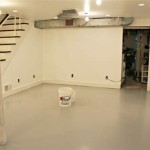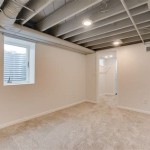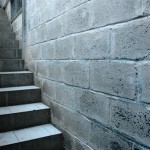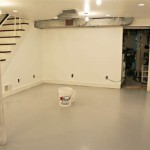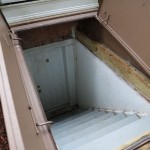Cost to Finish a Basement with a Full Bathroom
Finishing a basement adds valuable living space to a home, potentially increasing its resale value. Including a full bathroom in the basement remodel further enhances functionality and desirability. However, undertaking such a project requires careful budgeting. This article explores the various factors influencing the cost of finishing a basement and incorporating a full bathroom.
The overall cost is influenced by several key factors, including the basement's size, the chosen finishing materials, and the complexity of the bathroom installation. Geographic location also plays a significant role due to variations in labor costs and material prices. Existing basement conditions also contribute to the overall cost. A basement requiring significant repairs or waterproofing before finishing will naturally incur higher expenses.
Basement size directly impacts material and labor costs. Finishing a larger basement requires more materials like drywall, flooring, insulation, and paint. Labor costs also increase proportionally with the square footage of the project. A larger space requires more time for framing, electrical work, plumbing, and finishing.
Material selection represents a significant portion of the budget. Opting for high-end finishes like custom cabinetry, premium flooring, and luxurious bathroom fixtures will significantly increase the overall project cost. Conversely, choosing budget-friendly materials can help control expenses. Homeowners must carefully balance desired aesthetics with budgetary constraints.
Bathroom installation complexity contributes heavily to the overall project budget. If the bathroom's location requires extensive plumbing rerouting or new drain lines, costs will increase. The choice of bathroom fixtures also influences the budget. Installing a high-end shower system or a whirlpool tub adds to the plumbing and installation expenses.
Labor costs fluctuate regionally. Areas with higher labor rates will naturally experience higher overall basement finishing costs. Additionally, accessing specialized tradespeople, like plumbers and electricians, might be more expensive in certain areas. Obtaining multiple quotes from local contractors is crucial for accurate cost estimation.
The pre-existing condition of the basement significantly influences the project budget. Basements requiring extensive repairs, such as foundation cracks, water damage remediation, or mold removal, will incur additional costs. Addressing these issues before finishing is essential for ensuring the longevity and functionality of the renovated space.
Waterproofing is a critical consideration, particularly in basements prone to moisture. Implementing effective waterproofing measures, including exterior drainage systems, interior sealants, or sump pumps, adds to the project's upfront costs but can prevent costly repairs in the future.
Permitting requirements vary by location and can influence the overall project cost. Obtaining the necessary permits ensures the project complies with local building codes and regulations. Permit fees vary depending on the project's scope and the local jurisdiction.
Electrical and plumbing work represent significant cost components. Installing new electrical circuits, outlets, and lighting fixtures adds to the project budget. Similarly, plumbing work for the bathroom, including water supply lines, drain lines, and vent pipes, contributes to the overall cost.
HVAC considerations are essential for maintaining comfortable temperatures in the finished basement. Extending or modifying the existing HVAC system to accommodate the new living space adds to the project cost. Proper insulation and ventilation are crucial for maximizing energy efficiency and minimizing long-term heating and cooling expenses.
Framing and drywall installation constitute a substantial portion of the labor and material costs. Framing creates the walls and partitions for the finished space, while drywall provides the finished surfaces. The complexity of the layout and the number of walls impact the cost of these components.Flooring choices influence both material and labor costs. Installing hardwood flooring typically incurs higher expenses compared to carpet or laminate options. The size of the basement and the complexity of the installation also affect the flooring cost.
Painting and finishing touches add the final aesthetic elements to the finished basement. The cost of paint, primer, and other finishing materials contributes to the overall budget. The complexity of the paint job and the chosen finishes influence the labor cost.
Lighting and electrical fixtures contribute to both the aesthetic and functional aspects of the finished basement. The cost of fixtures, wiring, and installation varies depending on the chosen lighting scheme and the complexity of the electrical work.
Seeking professional advice and obtaining multiple bids from reputable contractors are essential steps in planning a basement finishing project. Comparing bids allows homeowners to evaluate different options and choose the best value for their investment. A detailed contract outlining the scope of work, materials, and payment schedule protects both the homeowner and the contractor.

Cost To Finish A Basement In 2024 Forbes Home

How Much Does It Cost To Finish A Basement 2024 Data Bob Vila

The Cold Hard Numbers Cost To Finish Basement

Adding A Bathroom To Basement Pros Cons Costs

Lancaster Basement Remodel How Much Will It Cost 2024

Basement Bathroom Cost These 5 Items Will Determine Your

How Much Does Remodeling A Basement Cost In New Jersey Jmc

Cost To Add A Basement Bathroom Bright Green Door

How Much Does It Cost To Finish A Basement 2024

How Much Does It Cost To Finish A Basement In 2024
See Also

